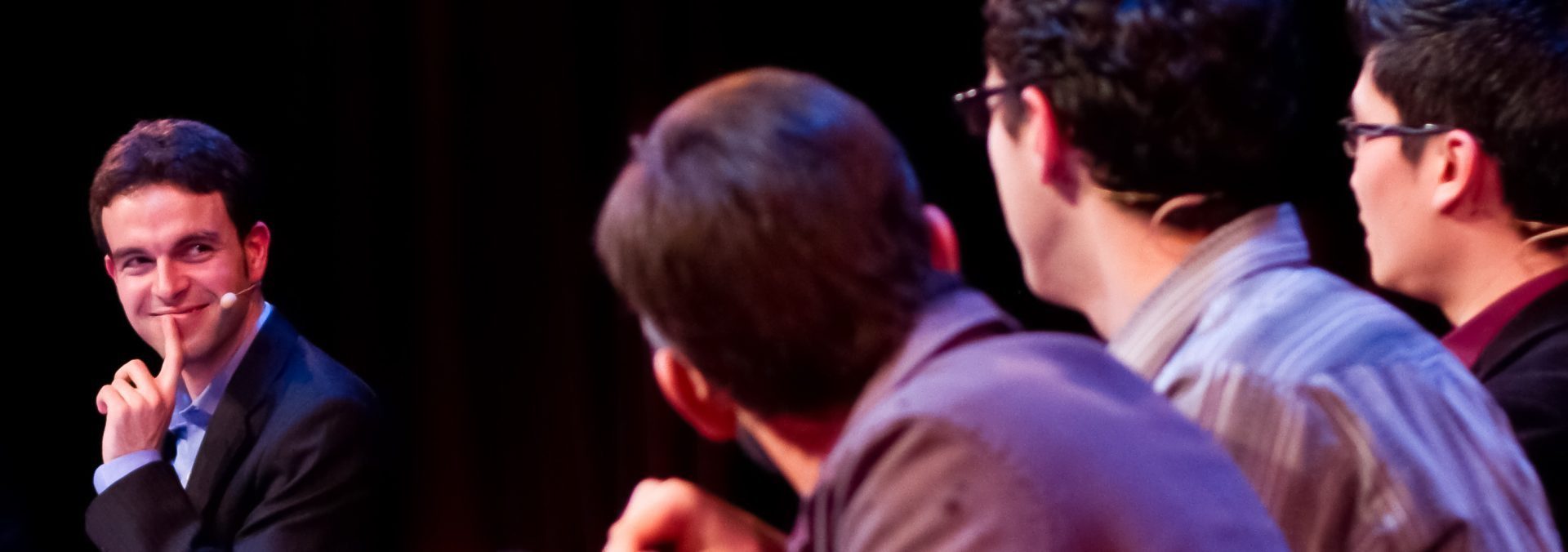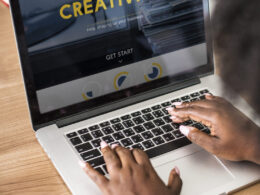I’m onstage next to an MIT quantum physicist and he’s going off script.
He just claimed to have sent an electron back in time and I can’t figure out whether he’s serious or joking. The packed audience – a sold-out crowd – leans forward in their seats. That’s when three professional comedians start heckling me.
That’s not a journal account of some bizarre fever dream, it’s actually a pretty typical moment in my life as the host and producer of You’re the Expert. You’re the Expert is a live show, podcast, and public radio program that uses comedy to make academic research more accessible and exciting. On each show, a panel of three comedians tries to guess (without doing any research ahead of time) what a distinguished professor in a somewhat obscure field studies all day. By the way, the MIT professor, Dr. Seth Lloyd, was serious. He actually sent an electron back in time. How is that not front-page news?
I started the show to answer that question: why isn’t the general public more aware of groundbreaking research and discoveries? Before I attempt to answer, let me briefly tell you about the journey that led to me sitting on stage.
After college, I started teaching in an elementary school. It was an eye-opening experience where I witnessed incredible human achievements like a third grader projectile vomiting straight up into the air or two kindergarteners deciding to bathe each other in milk and corn flakes. I also discovered that I really loved answering my students’ questions and figuring out how to explain complicated concepts simply enough for them to understand.
At night, I was performing comedy at clubs and theaters around Boston. I’ve always loved the release of comedy and that it attracts such a broad audience, but I started to get tired of the fact that it felt like the subject matter was so often the same. Being up on stage and having people’s attention is a privilege. Couldn’t I bring them something more meaningful while still making them laugh?
That’s where the first seed of You’re the Expert came from. The idea further developed while I was riding the public bus in Cambridge, Massachusetts between Harvard and MIT. The public bus isn’t often cited as a venue for epiphanies (except of the sort that involve the need for better instruction about personal hygiene in schools), but I was sitting on the bus thinking that it was very likely someone beside me was working on research that would one day change my life. Not only would I never get a chance to talk to them, I’d probably never even hear about their work. I realized that a socially acceptable way to interrogate a scientist about their research would be to do it in front of a paying crowd. Rather than an intensely awkward exchange on a public bus, it would probably be a hilarious live show. The dynamic of straight man and fool is a well-established comedic trope. The very best comedians, people like Richard Pryor or George Carlin, have changed the way we see the world around us. That’s exactly what scientists aim to do as well. Why not combine the best of both worlds.
I pitched the idea to a local group that funds new arts projects and won a small grant that I used to buy recording equipment and rent a space for our first live show. From there, I found a partner to help me with the technical elements of the show, recruited my first experts, booked comedians I knew from performing around town, and begged friends and family to come to our first show. Our first show sold out and, what’s more, people actually seemed to enjoy it. They told friends about it and our second show sold out even quicker. The same thing happened with our third show and so we were able to move to a much larger and more professional space.
Several important decisions led to our success on those first three shows and have contributed to You’re the Expert’s growth since. We decided to start small, betting that choosing a small space where we’d likely have to turn away potential audience members would increase the demand for the show. Everyone likes to be in on a cool, new event. By deliberately underestimating our initial audience, we were able to establish the show right away as popular and in-demand. Once audience members saw that we had a waitlist, we were able to create urgency around reserving and purchasing tickets in advance (avoiding the common trap of publicizing a show only to have audience members decide, night of, to just stay home).
Another important lesson involved the nuance of humor in marketing my idea. Although I often work with scientists now, I’m not really a science person. In college, I was the lone English major living in a house full of engineers. One of their favorite activities was to have me try to explain back to them the projects that they were working on. It felt like I was reading a foreign language out loud to a group of native speakers and butchering the pronunciation, leaving them in fits of laughter at my ignorance. I’ve never really subscribed to the whole “people laughing with you” is better than “people laughing at you” idea. If people are laughing, I’ll take it. Clearly there was something in this particular shtick of fool vs. expert.
The general public is much more interested in smart, meaningful content than people give them credit for. No one comes home after a full day of work wanting to sit through a long dry lecture, but no one is tuning in to The Daily Show or The Colbert Report or even You’re the Expert because they have to. They’re doing it because they want to. Comedy slides past our typical intellectual defenses. When a joke is successful, it works because it surprises you. It allows you to see from a new angle. We’re much more open to new ideas or even criticism of deeply held beliefs when expressed comically. We laugh and we connect without losing face. That’s the power of humor: that it can transform any topic or conversation into something joyful and worth sharing. I knew this intrinsically as a working comedian, but articulating the “why?” of the humor element has helped me focus the direction of our show.
Another big lesson I’ve taken from You’re the Expert is that there is immense value in actually doing something. Lots of people, particularly in entertainment or the performing arts, have ideas. Fewer people actually execute them. Just by having put on three shows at a small scale, we were able to convince a larger venue to book us and give us a chance. We were able to book bigger name comedians, who had been on Comedy Central and late night talk shows. We were able to book experts at the top of their fields. Each time I reached out, I expected to be laughed out of the room (and not in the good way). Instead, presenting experts and comics with the option of checking out a show beforehand almost always opened doors.
The best advice I’ve gotten has been from a public radio producer with decades of experience. I came to him with a long list of ideas and a stack of papers detailing possible marketing strategies and business plans. He patiently listened and then said, “it’s really much simpler than that. If you can make something that’s good enough that an audience member or listener will tell a friend about it, you’ll succeed. Find what’s working and expand it. Find what’s not working and relentlessly cut it. That’s all you need to do.”
You’re the Expert is now almost exactly a year old. Ticket sales from our live shows cover our costs and we’re looking to expand to New York and to put on touring shows at universities across the country. There are hundreds of logistical decisions that always need to get made, but at the core, I always remember, just make the show happen. Make it funny. Make it good enough that people talk about it. That’s the goal.






